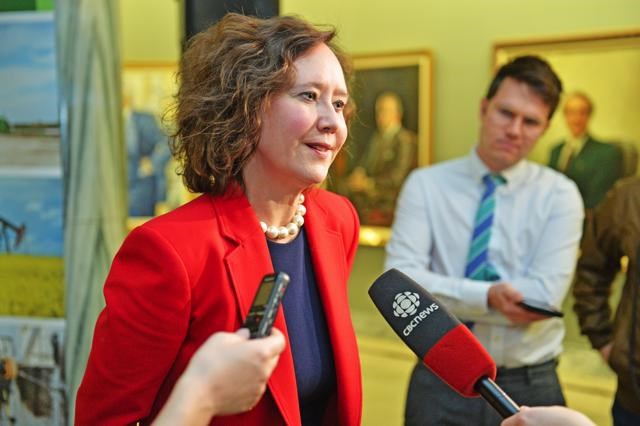In its efforts to reduce greenhouse gas emissions by 30 million tonnes per year, the federal government is working on developing a new Clean Fuel Standard (CFS), and that is ringing alarm bells for the Saskatchewan government, as expressed by Energy and Resources Minister Bronwyn Eyre.
The term clean fuel is not about reducing particulates or emissions of nitrous oxides, forms of air pollution. Rather, it’s all about reducing greenhouse gas emissions, particularly carbon dioxide, which the federal Liberal government has repeatedly referred to as “pollution.”
The Clean Fuel Standard includes “carbon intensity reduction requirements for liquid fuels,” which would start in 2022, as well as similar reductions for solid and gaseous fuels in 2023.
The plan “will require those who produce and import liquid fossil fuels in Canada to reduce the carbon intensity of the liquid fossil fuels they produce and import annually.” Fossil fuels like gasoline, diesel, kerosene, and light and heavy fuel oils are included, but “non-fossil fuels will not have a carbon intensity reduction requirement,” according to the Clean Fuel Standard: Proposed Regulatory Approach on the federal Environment and Climate Change website. “Low-carbon fuels” may include, but are not limited to ethanol, renewable diesel, biodiesel, hydro-treated vegetable oil, low-carbon-intensity jet fuel, synthetic fuels and renewable methanol.
Eyre has written to Minister of Natural Resources Seamus O’Regan, saying the Clean Fuel Standard, in its current form, “would amount to a second carbon tax that would cripple the economic growth and future competitiveness of vital Canadian sectors at the worst possible time. As currently envisioned, its implementation would also outpace the Canadian renewable fuel sector's ability to establish necessary infrastructure, which would result in significant foreign imports of renewable fuel products from the United States, in particular, and a disproportionate reliance on non-Canadian workers.
“As a result, I am asking that further policy advancement of the CFS regulations be placed on formal pause,” she wrote.
Eyre spoke about the matter by phone from Saskatoon. She said, “This is going to be an economic crippler. And it is a second carbon tax, it will be applied on top of the carbon tax on the same emissions. And there's a massive price tag to this thing. It's estimated it'll cost Canadians about $15 to $20 billion a year in higher household gas bills, higher prices at the pump, and about 15 per cent higher fuel costs for industry, which of course includes the energy and resources sector.”
She noted the name, “clean fuel standard,” is part of the battle, “because who could be against ‘clean fuel?’”
“It has a nice sounding name, but it has a huge economic crippling impact if this goes through,” Eyre said.
She noted the federal government is looking for the “breaking point, in other words, a way to force people off fossil fuels, so to break their dependence.”
Eyre said that it would be possible to buy credits, but at the high price of $350 per tonne, it’s really about forcing people off fuel.
Of particular concern is how the CFS would hurt the oil and gas as well as the mining industries, she noted in her letter. For the oil and gas sector, it would impact the usage of natural gas to create steam for thermal projects used in heavy oil and the oilsands, in addition to the fuel used in drilling, which “is almost at a standstill.”
And as a form of regulation, not legislation, it would not have to pass Parliament and not undergo Parliament’s scrutiny, according to Eyre.
She pointed out the renewable fuel sector is “nowhere even close” to С����Ƶ able to create enough fuel to replace fossil fuels. “So we would end up importing massively from the U.S., in particular, if this goes through. We would be helping U.S. workers and we’d be hurting our own, just a terrible thing across the board,” she said.
Eyre is concerned that the Clean Fuel Standard will feature largely in the upcoming federal Throne Speech and be promulgated through the Canada Gazette. Once that happens, its very difficult to make changes.
“There's very little we can do except speak out and raise awareness and get the word out,” she concluded.




